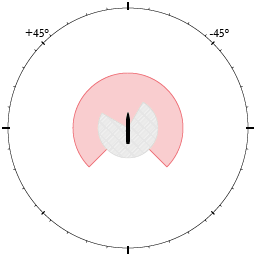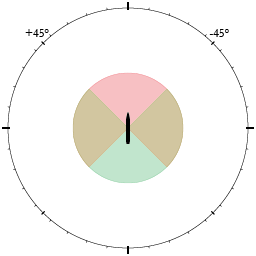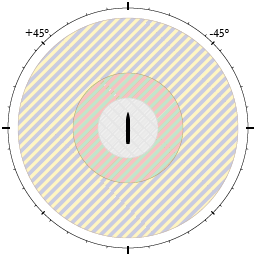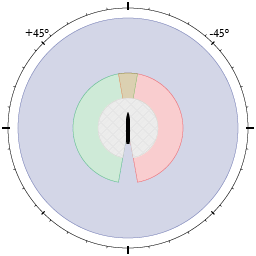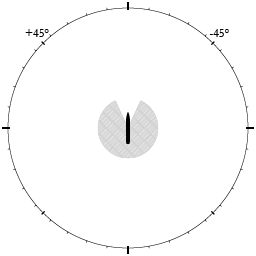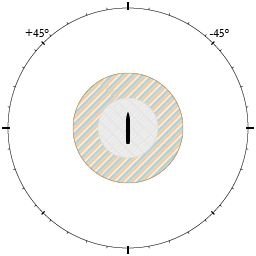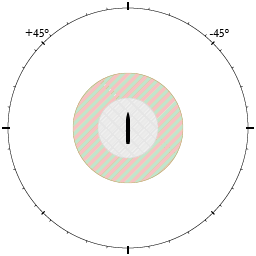DCS Reference: Ships, Eastern
Many carrier aircraft have somewhat contradictory definitions, or definitions of unclear value, as far as their carrying capacity. They may list only having 4 parking spots and a max number of aircraft or helicopters, in one sense, but then have coordinates set for over a dozen different parking spots on the deck. The blocks below distinguish between these two by calling them “nominal” and “defined” limits, where the nominal parking limit at most seems to correlate to how many different aircraft can be designated as “start on runway” in the mission editor.
The defensive arcs show the areas around the ship where specific defensive systems have full range of movement. This does not mean that areas that are not covered are safe — rather that the ship systems will be limited in their effectiveness because ship decks, conning towers, or bridges are in the way. However, given enough elevation, they can usually shoot over such obstructions, and only low-altitude skimming creates the coverage gaps demonstrated. In addition, depending on the guidance system of the weapon, they may be lofted above obstacles if the target is far enough away, which means that the “safe zone” only exists at low altitude and at close range.
Up to four range layers are shown in the arc sketches: close-range protection (from CIWS and simular systems); short-range protection, usually from IR-guided missiles; medium-range protection, usually from less advanced radar missiles; and long-range protection.
Since all ships only use a handful of weapon systems, the two are presented separately to reduce the amount of repetition.
Ships
Project 1124 Albatros / Grisha V-class Corvette
| Mission Editor Unit | Function | Stores | Range / Symbol | |
|---|---|---|---|---|
| FFL 1124.4 Grisha | Small anti-submarine ship | 1× 1000× A-213-Vympel-A CIWS 1× 22× 4K33 Osa-M 1× 180× 76mm 2× RBU-6000 ASM mortar[1] 2× 2× 533mm Torpedo[1] |
Detection: 0–16.2nm / 0–30km Detection alt.: 0–63,300ft / 0–19,300m[2] Engagement: 0–8.6nm / 0–16km Engagement alt.: 0–33,700ft / 25–10,300m[2] | |
| Hit points | 1,600 | Max speed | 15.4m/s (30kts, 55.5km/h) | Defensive arcs |
| Sensor limits | Surface radar: 360° horizontal × -3°–+10° vertical; 12s scan time. SS lock-on: 15.9nm / 29.5km. Notch: <15m/s (29kts, 54km/h) vrad. AA radar: 360° horizontal × -15°–+60° vertical; 1s scan time. AA lock-on: 13.8nm / 25.5km. Notch: <10m/s (19kts, 36km/h) vrad. The Osa tracker can guide a single missile at a single target. No target size limit defined. |
|||
| Carrying capacity | None. | |||
| Notes | ||||
| Hull number 140 was assigned to an Kashin-class ASW in the 1970s, an Alesha-class minelayer in the early 1980s, to a Molniya-2/Pauk-class ASW in the late 1980s, and to a Yaz-class artillery ship in the mid 1990s. The closest equivalent hull number for the correct type and period is 145 for the ship “MPK-202”.[3] | ||||
| Available to | ||||
Project 1135M Burevestnik M / Krivak II-class Frigate
| Mission Editor Unit | Function | Stores | Range / Symbol | |
|---|---|---|---|---|
| FF 1135M Rezky | Guard ship | 2× 22× 4K33 Osa-M 2× 175× 100mm 4× URK-5[1] 2× RBU-6000 ASM mortars[1] 2× 4× 533mm Torpedo[1] 4× PK-16 Decoy launcher[1] |
Detection: 0–16.2nm / 0–30km Detection alt.: 0–63,300ft / 0–19,300m[2] Engagement: 0–8.6nm / 0–16km Engagement alt.: 0–33,700ft / 25–10,300m[2] | |
| Hit points | 1,800 | Max speed | 16.7m/s (32kts, 59.3km/h) | Defensive arcs |
| Sensor limits | Surface radar: 360° horizontal × -3°–+10° vertical; 12s scan time. SS lock-on: 17.5nm / 32.4km. Notch: <15m/s (29kts, 54km/h) vrad. AA radar: 360° horizontal × -15°–+60° vertical; 1s scan time. AA lock-on: 13.8nm / 25.5km. Notch: <10m/s (19kts, 36km/h) vrad. Each Osa tracker can guide a single missile at a single target. No target size limit defined. |
|||
| Carrying capacity | None. | |||
| Notes | ||||
| Hull number was 690 at time of decommission. | ||||
| Available to | ||||
Project 1144 Orlan / Kirov-class Battlecruiser
| Mission Editor Unit | Function | Stores | Range / Symbol | |
|---|---|---|---|---|
| CGN 1144.2 Piotr Velikiy | Heavy Nuclear-powered Missile Cruiser | 6× 2×2000+64× 3M87 Kortik CIWS/Missile 4× 16× 3K95 Kinzhal 6× 8× S-300F Fort 6× 5× S-300FM Fort-M 4× 5× P-700 Granit 1× 2×180× twin AK-130 130mm 1× RBU-12000 ASM mortar[1] 2× RBU-1000 ASM mortar[1] |
Detection: 0–97.2nm / 0–180km Detection alt.: 0–49,200ft / 0–15,000m Engagement: 1.1–64.8nm / 2–120km Engagement alt.: 82–98,400ft / 25–30,000m | |
| Hit points | 6,500 | Max speed | 16.0m/s (31.1kts, 57.6km/h) | Defensive arcs |
| Sensor limits | Surface radar: 360° horizontal × -3°–+10° vertical; 12s scan time. SS lock-on: 21.6nm / 40km. Notch: <15m/s (29kts, 54km/h) vrad. AA radar: 360° horizontal × -15°–+60° vertical; 1s scan time. AA lock-on: 72.9nm / 135km. Notch: <10m/s (19kts, 36km/h) vrad. Each Kortik can engage a single target with 2 guns/1 missile at a time. The Kinzhal tracker can guide 2 missiles at a single target. S-300 trackers can guide 2 missiles per target at 2 targets at a time. Target size limit: 0.049m².[4] |
|||
| Carrying capacity | 1 defined helicopter parking spots. 1 helicopter nominal capacity. | |||
| Notes | ||||
| Acts as a warehouse to deliver stores to other units and to landed aircraft. Per the internal definitions, it cannot re-arm its own weapon stores once depleted.
The engagement limits only apply to the S-300 tracking radar. Other systems have lower minimum and maximum ranges. Is internally defined to allow attacks against targets up to 297nm / 550km away, presumably to allow for Granit targeting. | ||||
| Available to | ||||
Project 1164 Atlant / Slava-class Cruiser
| Mission Editor Unit | Function | Stores | Range / Symbol | |
|---|---|---|---|---|
| CG 1164 Moskva | Guided Missile Cruisers | 6× 1000× A-213-Vympel-A CIWS 2× 22× 4K33 Osa-M 8× 8× S-300F Fort 16× P-500 Bazalt 1× 2×180× twin AK-130 130mm 2× RBU-6000 ASM mortar[1] 2× PK-2 chaff/flare launcher[1] |
Detection: 0–86.4nm / 0–160km Detection alt.: 0–337,400ft / 0–102,800m[2] Engagement: 1.1–64.8nm / 2–120km Engagement alt.: 82–98,400ft / 25–30,000m | |
| Hit points | 5,200 | Max speed | 16.7m/s (32.5kts, 60.2km/h) | Defensive arcs |
| Sensor limits | Surface radar: 360° horizontal × -3°–+10° vertical; 12s scan time. SS lock-on: 21.6nm / 40km. Notch: <15m/s (29kts, 54km/h) vrad. AA radar: 360° horizontal × -15°–+60° vertical; 1s scan time. AA lock-on: 72.9nm / 135km. Notch: <10m/s (19kts, 36km/h) vrad. Each weapon system can guide a single missile/gun to a single target. Target size limit: 0.049m².[4] |
|||
| Carrying capacity | 1 defined helicopter parking spots. 1 helicopter nominal capacity. | |||
| Notes | ||||
| Acts as a warehouse to deliver stores to other units and to landed aircraft. Per the internal definitions, it cannot re-arm its own weapon stores once depleted.
The engagement limits only apply to the S-300 tracking radar. Other systems have lower minimum and maximum ranges. Is internally defined to allow attacks against targets up to 270nm / 500km away, presumably to allow for Bazalt targeting. | ||||
| Available to | ||||
Project 1241 / Tarantul III-class Corvette
| Mission Editor Unit | Function | Stores | Range / Symbol | |
|---|---|---|---|---|
| FSG 1241.1MP Molniya | Missile boat | 2× 1000× A-213-Vympel-A CIWS 4× P-270 Moskit 1× 180× 76mm 4× PK-10 Decoy launcher[1] 2× PK-16 Decoy launcher[1] |
Detection: 0–16.2nm / 0–30km Detection alt.: 0–44,300ft / 0–13,500m[2] Engagement: 0–1.1nm / 0–2km Engagement alt.: 0–4,200ft / 0–1,300m[2] | |
| Hit points | 1,100 | Max speed | 18.5m/s (36kts, 66.7km/h) | Defensive arcs |
| Sensor limits | Multi-role radar: 360° horizontal × -4°–+70° vertical; 12s scan time. Radar lock-on: 15.4nm / 28.4km. Notch: <27.8m/s (54kts, 100km/h) vrad. Target size limit: 0.1m².[4] |
|||
| Carrying capacity | None. | |||
| Notes | ||||
| Should have 4× 9K32 Strela-2 / SA-7 “Grail” launchers, but no such capability is modelled.
Is internally defined to allow attacks against targets up to 65nm / 120km away, presumably to allow for Moskit targeting. | ||||
| Available to | ||||
Project 11435 / Kuznetsov-class Carrier
| Mission Editor Unit | Function | Stores | Range / Symbol | |
|---|---|---|---|---|
| CV 1143.5 Admiral Kuznetsov CV 1143.5 Admiral Kuznetsov (2017) (Supercarrier) |
Heavy aircraft-carrying cruiser | 8× 2×2000+64× 3M87 Kortik CIWS/Missile 6× 1000× A-213-Vympel-A CIWS 4× 48× 3K95 Kinzhal 2× RBU-12000 ASM mortar[1] 2× 6× P-700 Granit |
Detection: 0–13.5nm / 0–25km Detection alt.: 0–62,800ft / 0–19,100m[2] Engagement: 0–6.5nm / 0–12km Engagement alt.: 0–30,200ft / 25–9,200m[2] | |
| Hit points | 7,000 | Max speed | 16.5m/s (32kts, 59.2km/h) | Defensive arcs |
| Sensor limits | Surface radar: 360° horizontal × -3°–+10° vertical; 12s scan time. SS lock-on: 21.1m / 39km. Notch: <15m/s (29kts, 54km/h) vrad. AA radar: 360° horizontal × -15°–+60° vertical; 1s scan time. AA lock-on: 11.5nm / 21.3km. Notch: <10m/s (19kts, 36km/h) vrad. Each Kortik can engage a single target with 2 guns/1 missile at a time. Each Vympel tracker can engage a single target. Each Kinzhal tracker can guide 2 missiles at a single target. Target size limit: 0.02m².[4] |
|||
| Carrying capacity | 9 defined aircraft parking spots. 8 defined helicopter parking spots. 3 nominal spawn points. 24 aircraft + 12 helicopter nominal capacity. | |||
| Notes | ||||
| Acts as a warehouse to deliver stores to other units and to landed aircraft. Per the internal definitions, it cannot re-arm its own weapon stores once depleted.
Is internally defined to allow attacks against targets up to 297nm / 550km away, presumably to allow for Granit targeting. The 2017 version requires the Supercarrier module to use, control, and/or add to missions. Listed in-game as project number 1143.5 (Kiev class) rather than 11435 (Kuznetsov-class).[3] | ||||
| Available to | ||||
Project 11540 Yastreb / Neustrashimy-class Frigate
| Mission Editor Unit | Function | Stores | Range / Symbol | |
|---|---|---|---|---|
| FFG 11540 Neustrashimy | Guard Ships | 2× 2×2000+64× 3M87 Kortik CIWS/Missile 4× 8× 3K95 Kinzhal 1× 175× 100mm 1× RBU-6000 ASM mortar[1] 6× 533mm Torpedo[1] |
Detection: 0–14.6nm / 0–27km Detection alt.: 0–56,900ft / 0–17,400m[2] Engagement: 0.5–14.6nm / 1–27km Engagement alt.: 32–75,400ft / 10–23,000m | |
| Hit points | 2,180 | Max speed | 16.5m/s (32kts, 59.2km/h) | Defensive arcs |
| Sensor limits | Surface radar: 360° horizontal × -3°–+10° vertical; 12s scan time. SS lock-on: 18.1m / 33.6km. Notch: <15m/s (29kts, 54km/h) vrad. AA radar: 360° horizontal × -15°–+60° vertical; 1s scan time. AA lock-on: 11.5nm / 21.3km. Notch: <10m/s (19kts, 36km/h) vrad. Each Kortik can engage a single target with 2 guns/1 missile at a time. Each Kinzhal tracker can guide 2 missiles at a single target. Target size limit: 0.02m².[4] |
|||
| Carrying capacity | 1 defined helicopter parking spots. 1 helicopter nominal capacity. | |||
| Notes | ||||
| Acts as a warehouse to deliver stores to other units and to landed aircraft. Per the internal definitions, it cannot re-arm its own weapon stores once depleted.
While the Kortik guns are situated behind the bridge and should not be able to fire forward, they are able to fire straight ahead through the ship model without any ill effects. | ||||
| Available to | ||||
Type 052B Guangzhou-class / Luyang I-class Destroyer
| Mission Editor Unit | Function | Stores | Range / Symbol | |
|---|---|---|---|---|
| Type 052B Destroyer | Multirole missile destroyer | 2× 24× 3S90M Smerch 2× 2000× H/PJ-12 CIWS 4× 4× YJ-83 ASM 1× 480× Type 210 100mm 4× Type 726-4 CM launcher[1] 2× 6× Type 87 ASW rocket[1] |
Detection: 0–54nm / 0–100km Detection alt.: 0–323,100ft / 0–98,500m[2] Engagement: 0.5–80.1nm / 1–150km Engagement alt.: 16–98,400ft / 5–30,000m | |
| Hit points | 2,700 | Max speed | 15.4m/s (30kts, 55.5km/h) | Defensive arcs |
| Sensor limits | Surface radar: 360° horizontal × -3°–+10° vertical; 12s scan time. SS lock-on: 18.4m / 34km. Notch: <15m/s (29kts, 54km/h) vrad. AA Search radar: 360° horizontal × -15°–+60° vertical; 1s scan time. AA SR lock-on: 45.9nm / 86km. Notch: <15m/s (29kts, 54km/h) vrad. AA Tracking radar: 360° horizontal × -15°–+60° vertical; 1s scan time. AA TR lock-on: 19.4nm / 36km. Notch: <10m/s (19kts, 36km/h) vrad. Smerch trackers can guide 1 missile at 2 targets at a time. Target size limit: 0.05m².[4] |
|||
| Carrying capacity | 1 defined helicopter parking spots. 1 helicopter nominal capacity. | |||
| Notes | ||||
| Acts as a warehouse to deliver stores to other units and to landed aircraft. Per the internal definitions, it cannot re-arm its own weapon stores once depleted.
The engagement limits only apply to the Smerch tracking radar. Other systems have lower minimum and maximum ranges. Note that the engagement limits differ significantly from the lock-on and tracking limts as well as the missile's flight range, which may cause wasted shots from the AI. Is internally defined to allow attacks against targets up to 243nm / 450km away, presumably to allow for YJ-83 targeting. | ||||
| Available to | ||||
Type 052C / Luyang II-class Destroyer
| Mission Editor Unit | Function | Stores | Range / Symbol | |
|---|---|---|---|---|
| Type 052C Destroyer | Guided missile destroyer | 8× 6× HHQ-9 2× 2000× H/PJ-12 CIWS 2× 4× YJ-62 ASM 1× 480× Type 210 100mm 4× Type 726-4 CM launcher[1] |
Detection: 0–140.4nm / 0–260km Detection alt.: 0–840,100ft / 0–256,100m[2] Engagement: 0–54nm / 0–100km Engagement alt.: 16–98,400ft / 5–30,000m | |
| Hit points | 3,200 | Max speed | 15.4m/s (30kts, 55.5km/h) | Defensive arcs |
| Sensor limits | Surface radar: 360° horizontal × -3°–+10° vertical; 12s scan time. SS lock-on: 21.6m / 40km. Notch: <15m/s (29kts, 54km/h) vrad. AA radar: 360° horizontal × -15°–+60° vertical; 1s scan time. AA lock-on: 119.3nm / 221km. Notch: <15m/s (29kts, 54km/h) vrad. HHQ-9 trackers can guide 2 missiles per target at 8 targets at a time. Target size limit: 0.02m².[4] |
|||
| Carrying capacity | 1 defined helicopter parking spots. 1 helicopter nominal capacity. | |||
| Notes | ||||
| Acts as a warehouse to deliver stores to other units and to landed aircraft. Per the internal definitions, it cannot re-arm its own weapon stores once depleted.
The engagement limits only apply to the HHQ-9 tracking radar. Is internally defined to allow attacks against targets up to 243nm / 450km away, presumably to allow for YJ-62 targeting. | ||||
| Available to | ||||
Type 054A / Jiangkai II-class Frigate
| Mission Editor Unit | Function | Stores | Range / Symbol | |
|---|---|---|---|---|
| Type 054A Frigate | Multi-role frigate | 4× 8× HQ-19 2× 2000× H/PJ-12 CIWS 2× 4× YJ-83 ASM 1× 480× PJ26 76mm 2× Type 726-4 CM launcher[1] 2× 6× Type 87 ASW rocket[1] |
Detection: 0–86.4nm / 0–160km Detection alt.: 0–517,000ft / 0–157,800m[2] Engagement: 0–24.3nm / 0–45km Engagement alt.: 16–98,400ft / 5–30,000m | |
| Hit points | 2,500 | Max speed | 15.4m/s (30kts, 55.5km/h) | Defensive arcs |
| Sensor limits | Surface radar: 360° horizontal × -3°–+10° vertical; 12s scan time. SS lock-on: 18.4m / 34km. Notch: <15m/s (29kts, 54km/h) vrad. AA radar: 360° horizontal × -15°–+60° vertical; 1s scan time. AA lock-on: 19.4nm / 36km. Notch: <10m/s (19kts, 36km/h) vrad. HQ-16 trackers can guide 2 missiles per target at 4 targets at a time. Target size limit: 0.04m².[4] |
|||
| Carrying capacity | 1 defined helicopter parking spots. 1 helicopter nominal capacity. | |||
| Notes | ||||
| Acts as a warehouse to deliver stores to other units and to landed aircraft. Per the internal definitions, it cannot re-arm its own weapon stores once depleted.
The engagement limits only apply to the HQ-16 tracking radar. Is internally defined to allow attacks against targets up to 243nm / 450km away, presumably to allow for YJ-83 targeting. | ||||
| Available to | ||||
Type 071 / Yuzhao-class Amphibious Transport Dock
| Mission Editor Unit | Function | Stores | Range / Symbol | |
|---|---|---|---|---|
| Type 071 Amphibious Transport Dock |
Amphibious transport dock | 4× 1000× A-213-Vympel-A CIWS 1× 180× 76mm 4× Type 726-4 CM launcher[1] |
Detection: 0–16.2nm / 0–30km Detection alt.: 0–75,400ft / 0–23,000m[2] Engagement: 0–1.9nm (11,400ft) / 0–3.5km Altitude: 0–8,200ft / 0–2,500m | |
| Hit points | 7,300 | Max speed | 12.8m/s (24.8kts, 46km/h) | Defensive arcs |
| Sensor limits | Surface radar: 360° horizontal × -3°–+10° vertical; 12s scan time. SS lock-on: 18.4m / 34km. Notch: <15m/s (29kts, 54km/h) vrad. |
|||
| Carrying capacity | 2 defined helicopter parking spots. 2 helicopter nominal capacity. | |||
| Notes | ||||
| Acts as a warehouse to deliver stores to other units and to landed aircraft. Per the internal definitions, it cannot re-arm its own weapon stores once depleted.
Its detection and engagement range are defined to be orders of magnitude higher than any of its sensors and weapon systems could possibly reach or make use of, causing the threat circles in the mission editor to be massively and ridiculously over-exaggerated. At best, they can be used as a very inaccurate indication of the effective range of any helicopters on board. The engagement ranges listed are what the on-board Vympel trackers is actually capable of. Curiously enough, an LSO and a dock view are defined, using virtual DShK machine-gun mounts to create their respective viewpoints. | ||||
| Available to | ||||
Type 093 / Shang-class Attack Submarine
| Mission Editor Unit | Function | Stores | Range / Symbol | |
|---|---|---|---|---|
| Type 093 Attack Submarine |
Attack Submarine | 18× Yu-6 Torpedo 4× YJ-84 ASM |
Detection: 0–5.4nm / 0–10km Detection alt.: 0–32,300ft / 0–9,800m[2] Engagement: 2.7nm–32.4nm / 5–60km | |
| Hit points | 1,500 | Max speed | 14.9m/s (29kts, 54km/h) | Defensive arcs |
| Sensor limits | Surface radar: 360° horizontal × -3°–+10° vertical; 12s scan time. SS lock-on: 18.4m / 34km. Notch: <15m/s (29kts, 54km/h) vrad. AA Tracking radar: 360° horizontal × -15°–+60° vertical; 1s scan time. AA TR lock-on: 19.4nm / 36km. Notch: <10m/s (19kts, 36km/h) vrad. YU-6 trackers can guide 18 torpedoes at a time. |
|||
| Notes | ||||
| While the 093 has no defined anti-air weapons, it is defined with sensor capabilities and defensive behaviours that will let it react to nearby aircraft — and more importantly air-launched anti-ship weapons — unlike the SSK 641 and 877. Its range definitions and threat rings apply more to other ships than to aircraft, and the on-board weapon systems can actually engage targets farther out than the threat ring would suggest. | ||||
| Available to | ||||
Systems
These stats apply to the baseline version of the respective systems. Occasionally, different platforms will overwrite some values, such as ammunition capacity and engagement limits, by their own specific on-board limitations.
3K95 Kinzhal / SA-N-9 Gauntlet
| System / function | Guidance | Stores | Range |
|---|---|---|---|
| Tor-M1 anti-air/anti-missile. | Semi-active radar | 8× 9M331 | Engagement: 0.8–6.5nm / 1.5–12km Altitude: 32.8–19,600ft / 10–6,000m Max speed: Mach: 3.0 |
| Reload / rearm | 3s to ready a new missile; cannot be rearmed once depleted. | ||
| Acquisition time | 6s | ||
| Acquisition limits | Target size limit: 0.02m².[4] | ||
| Aiming limits | N/A. Uses vertical launch system. | ||
| Kill radius | 7m | ||
| Available on | |||
| 1144.2 Pyotr Velikiy, 11435 Admiral Kuznetsov, 11540 Neustrashimy | |||
| Tactics | |||
| Navalised Tor-M1 / SA-15 system, also exported as “Klinok”. Similar tactics apply: fly above it and preferably use bombs against the carrying ship since the missile is very capable at intercepting incoming guided ordnance. | |||
3M86 Kortik / CADS-N-1 Kashtan CIWS
| System / function | Guidance | Stores | Range |
|---|---|---|---|
| 2× GSh-6-30K CIWS | Radar | 2× 2000× 30mm | Engagement: 0–1.9nm (11,400ft) / 0–3.5km Altitude: 0–8,200ft / 0–2,500m |
| Tunguska anti-air/anti-missile | SACLOS/Radar | 8× 9M311 | Engagement: 1.6–4.3nm / 3–8km Altitude: 47.6–11,400ft / 14.5–3,500m Max speed: Mach: 2.82 |
| Reload / rearm | GSh-6-30K: RoF: 11,000 rpm; cannot be rearmed once depleted. 9M311: 1s to ready a new missile; 960s total rearm time.[5] | ||
| Acquisition time | GSh-6-30K: 3s 9M311: 5s | ||
| Acquisition limits | Target size limit: 0.1m².[4] | ||
| Aiming limits | Varies with mount. | ||
| Kill radius | 7m | ||
| Available on | |||
| 1144.2 Pyotr Velikiy, 11435 Admiral Kuznetsov, 11540 Neustrashimy | |||
| Tactics | |||
| Essentially a navalised SA-19 Tunguska, except the autocannons have been replaced by two 30mm rotary cannons. Unlike the land-based Tunguska, this system will almost universally give launch warnings since it is part of the overall ship radar guidance system rather than being optically guided, so the only surprise is that ships love to fire them in clusters of roughly a fuckjillion at a time. Distance and altitude helps, and the two systems are not quite as adept at intercepting incoming missiles as the Kinzhal… but unfortunately, any ship that uses one also uses the other in some form, so that is not much of a limitation. | |||
3S90M Smerch / SA-N-12 “Grizzly”
| System / function | Guidance | Stores | Range |
|---|---|---|---|
| Smerch anti-air/anti-missile. | Semi-active radar | 24× 9M317 | Engagement: 1.9–54nm / 3.5–100km Low alt. flight range: 0.3–16.2nm / 0.5–30km Hight alt. flight range: 0.3–21.6nm / 0.5–40km Altitude: 16.4–49,200ft / 5–15,000m Max speed: Mach: 4.5 |
| Reload / rearm | 8s to ready a new missile; 10s to reload; cannot be rearmed once depleted. | ||
| Acquisition time | 10s | ||
| Acquisition limits | Target size limit: 0.05m².[4] | ||
| Aiming limits | 360° horizontal × -10°–+90° vertical. | ||
| Kill radius | 13m | ||
| Available on | |||
| 052B | |||
| Tactics | |||
| Navalised Buk-M3 / SA-11 system. It improves significantly over the land-based system by having much more capable anti-missile self-defense capabilities, thereby covering up the main weakness that could be exploited. It gives up some altitude in the process which might, on a good day, alow for bombs dropped from a very high altitude to slip through. | |||
4K33 Osa-M / SA-N-4 “Gecko”
| System / function | Guidance | Stores | Range |
|---|---|---|---|
| Osa-M anti-air | Semi-active radar | 22× 9M311 | Low alt. engagement: 0.8–4.5nm / 1.5–8.5km High alt. engagement: 0.8–5.6nm / 1.5–10.3km Altitude: 32.8–16,400ft / 10–5,000m Max speed: Mach: 2.1 |
| Reload / rearm | 18s to ready a new missile (applies in parallel on dual-rail); 3s total reload time (loads in parallel); cannot be rearmed once depleted. | ||
| Acquisition time | 1s | ||
| Acquisition limits | No target size limit defined. | ||
| Aiming limits | 360° horizontal × -0.5°–+89.9° vertical. | ||
| Kill radius | 5m | ||
| Notes | |||
| Usually rail-mounted, either singularly or as a pair, each with its own ammunition storage.
May have some nominal anti-missile capability depending on default values in either the sensors or the carrying platform, but the low range and speed will make any intercept unlikely to begin with. | |||
| Available on | |||
| 1124.4 Grisha, 1135M Rezky, 1164 Moskva | |||
| Tactics | |||
| A naval version of the 9K33 Osa / SA-8 system, it is mosly found on older ships, either as a backup system to something more capable, or as a complement to a CIWS that is dedicated to anti-missile defence. Unlike most other systems, anti-ship missiles stand a chance of penetrating Osa coverage. | |||
A-213-Vympel-A / AK-630 CIWS
H/PJ12 / Type 730 CIWS
| System / function | Guidance | Stores | Range |
|---|---|---|---|
| GSh-6-30K CIWS | Radar | 2000× 30mm | Engagement: 0–1.9nm (11,400ft) / 0–3.5km Altitude: 0–8,200ft / 0–2,500m |
| Reload / rearm | RoF: 5500 rpm; cannot be rearmed once depleted. | ||
| Acquisition time | 3s | ||
| Acquisition limits | Target size limit: 0.1m².[4] | ||
| Aiming limits | 360° horizontal × -12°–+88° vertical. | ||
| Kill radius | N/A | ||
| A-213-Vympel-A / AK-630 CIWS Available on | |||
| 1124.4 Grisha, 1164 Moskva, 1241.1MP Molniya, 11435 Admiral Kuznetsov, 071 | |||
| H/PJ12 / Type 730 CIWS Available on | |||
| 052B, 052C, 054A | |||
| Tactics | |||
| The same rotary autocannon as in the later, more advanced, Kortik CIWS. The system consists of the autocannon, the swiveling turret, and a Vympel tracking radar.
The H/PJ12 is effectively the same as the Vympel CIWS, but made in China with a different mount and target tracking radar. | |||
HHQ-9
| System / function | Guidance | Stores | Range |
|---|---|---|---|
| HHQ-9 anti-air/anti-missile. | Semi-active radar | 6× HHQ-9 | Low alt. engagement: 5.4–32.4nm / 10–60km High alt. engagement: 5.4–54nm / 10–100km Altitude: 32–114,800ft / 10–35,000m Max speed: Mach: 5.0 |
| Reload / rearm | 2s to ready a new missile; cannot be rearmed once depleted. | ||
| Acquisition time | 2s | ||
| Acquisition limits | Target size limit: 0.02m².[4] | ||
| Aiming limits | N/A. Uses vertical launch system. | ||
| Kill radius | 20m | ||
| Notes | |||
| The missile itself has a minimum launch range of only 0.4nm / 0.8km, but the launching system as a whole has a lower engagement limit of 5.4nm / 10km. This is most likely set up to avoid wasting shots from the VLS on targets that the missile has no chance of arcing down and hitting anyway. | |||
| Available on | |||
| 052C | |||
| Tactics | |||
| A Chinese reinterpretation of the S-300 / SA-10, this system improves on that baseile, but does not quite reach the levels of evilness of the SA-20. It flies farther and, perhaps more crucially, lower than the SA-10, and thus fills in some of the more critical gaps of that system, but in doing so, it creates a new gap that can occasionally be exploited: it is horrible at engaging close-range targets. It requires some pretty specific circumstances (as well as ignoring the presence of CIWS systems), but if you can use coastal terrain to get close and personal, the missiles will not be able to hit you. | |||
HQ-16
| System / function | Guidance | Stores | Range |
|---|---|---|---|
| HQ-16 anti-air/anti-missile. | Semi-active radar | 1× HQ-16 | Engagement: 0.5–24.3nm / 1–45km Low alt. flight range: 0.3–21.6nm / 0.5–30km High alt. flight range: 0.3–27nm / 0.5–50km Altitude: 16–114,800ft / 5–35,000m Max speed: Mach: 4.0 |
| Reload / rearm | 6s to ready a new missile; cannot be rearmed once depleted. | ||
| Acquisition time | 8s | ||
| Acquisition limits | Target size limit: 0.02m².[4] | ||
| Aiming limits | N/A. Uses vertical launch system. | ||
| Kill radius | 15m | ||
| Notes | |||
| The missile itself has a minimum launch range of only 0.4nm / 0.8km, but the launching system as a whole has a lower engagement limit of 5.4nm / 10km. This is most likely set up to avoid wasting shots from the VLS on targets that the missile has no chance of arcing down and hitting anyway. | |||
| Available on | |||
| 054A | |||
| Tactics | |||
| What the HHQ-9 is to the SA-10, the HQ-16 is to the Buk-M3 / SA-11: improved range, altitude, targeting, and engagement capabilities except that its VLS means that it is not quite as effective at short ranges. Even so, that short range gap is still very small and is trivially covered by CIWS systems. | |||
S-300F Fort / SA-N-6 “Grumble”
| System / function | Guidance | Stores | Range |
|---|---|---|---|
| Fort anti-air/anti-missile. | Semi-active radar | 8× 5V55 | Engagement: 2.7–64.8nm / 5–120km Low alt. flight range: 2.7–16.2nm / 5–30km High alt. flight range: 2.7–40.4nm / 5–75km Altitude: 82–98,400ft / 25–30,000m Max speed: Mach: 5.0 |
| Reload / rearm | 3s to ready a new missile; cannot be rearmed once depleted. | ||
| Acquisition time | 10s | ||
| Acquisition limits | Target size limit: 0.049m².[4] | ||
| Aiming limits | N/A. Uses vertical launch system. | ||
| Kill radius | 20m | ||
| Notes | |||
| Has an engagement range that is longer than the actual flight range of the missile, which may cause some over-enthusiastic firing.
Can have issues with engaging anti-ship and cruise missiles during their terminal phase due to the relatively high minimum altitude, but generally has enough range to engage such missiles before they descend. | |||
| Available on | |||
| 1144.2 Pyotr Velikiy, 1164 Moskva | |||
| Tactics | |||
| The naval version of the S-300 / SA-10, with all the threat level this implies. Its only real downside is that the way it is set up, the AI may be a bit early on the trigger, causing it to waste missiles (but most ships generally have quita a few to spare) and that it has a fairly high minimum altitude as far as shipborne systems are concerned. Then again, skimming along at less than 80ft / 25m for as long as is required to evade this system is quite a challenge, and you still generally have to face various back-up armaments and CIWS at the very end. | |||
S-300FM Fort-M / SA-N-20 “Grumble”
| System / function | Guidance | Stores | Range |
|---|---|---|---|
| Fort-M anti-air/anti-missile. | Semi-active radar | 5× 48N6E2 | Low alt. engagement: 3.2–16.2nm / 6–30km High alt. engagement: 3.2–81nm / 6–150km Altitude: 32.8–98,400ft / 25–30,000m Max speed: Mach: 8.6 |
| Reload / rearm | 3s to ready a new missile; cannot be rearmed once depleted. | ||
| Acquisition time | 10s | ||
| Acquisition limits | Target size limit: 0.049m².[4] | ||
| Aiming limits | N/A. Uses vertical launch system. | ||
| Kill radius | 25m | ||
| Available on | |||
| 1144.2 Pyotr Velikiy | |||
| Tactics | |||
| Not just the the regular S-300 / SA-10, but the upgraded SA-20 version with a much more capable missile. The methods available against the SA-N-6 are now right out: sea skimming has to be done below 32ft / 10m, and the missile range now matches the flight range, so there will be no wasted shots. Also, there will be multiple highly capable weapons in several more layers before you get anywhere close to the ship.
Maybe just skip the whole airplane bit and get a submarine? | |||
Notes
- ↑ 1.00 1.01 1.02 1.03 1.04 1.05 1.06 1.07 1.08 1.09 1.10 1.11 1.12 1.13 1.14 1.15 1.16 1.17 1.18 1.19 1.20 Present on the model, but not functional.
- ↑ 2.00 2.01 2.02 2.03 2.04 2.05 2.06 2.07 2.08 2.09 2.10 2.11 2.12 2.13 2.14 This unit uses an antiquated and simplified sensor definition based on angles to define its search altitude, as opposed to more moden explicit limits.
- ↑ 3.0 3.1 See http://russianships.info/eng/warships/
- ↑ 4.00 4.01 4.02 4.03 4.04 4.05 4.06 4.07 4.08 4.09 4.10 4.11 4.12 4.13 4.14 4.15 Compare, effective target sizes:
- Small: Vikhr: 0.012m² · AGM-114: 0.015m² · AGM-122: 0.03m² · BGM-71 0.033m²
- Medium: AGM-88 / C-701 / LD-10: 0.05m² · Kh-23 / Kh-25 / Kh-66: 0.06m² · AGM-154 0.05–0.062m³ · AGM-65 / Rb-75: 0.063m² · LS-6: 0.07m² · C-802 / AGM-45: 0.09m²
- Large: GB-6 / Kh-35: 0.1m² · Kh-58 / Rb-04 / Rb-05 / Rb-15 / Sea Eagle: 0.12m² · AGM-84: 0.08–0.17m² · AGM-86 / Kh-65: 0.17m² · Kh-29: 0.18m² · Kh-59: 0.2m² · Kh-31: 0.3m² · BK-90: 0.4m²
- OMFG: ADM-141: 0.9–1.2m² · Kh-22: 1.82m² ·
- ↑ A rearm time is defined for this system, but it is unclear if it matters since shipboard systems as a rule cannot be rearmed once depleted.



